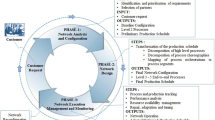Abstract
Business systems are considered as complex systems and consist of several sub-models such as procurement market, supply process, assembly, distribution and sales market. In these systems, it is important to analyze strength and weakness of each sub-model over other parts in order to obtain information for enhancing the business system performance. To fulfill this aim, in this paper we utilize differential Hebbian learning-based dynamic fuzzy cognitive map techniques to examine the effect of expert’s knowledge as a sort of digital transformation source as well as impact of each sub-model of business system over other sub-models. Finally, the proposed method is illustrated numerically.














Similar content being viewed by others
References
Amirkhani, A., Nasiriyan-Rad, H., Papageorgiou, E.I.: A novel fuzzy inference approach: neuro-fuzzy cognitive map. Int. J. Fuzzy Syst. 22, 859–872 (2020). https://doi.org/10.1007/s40815-019-00762-3
Agarwal, R., Gao, G.G., DesRoches, C., Jha, A.K.: The digital transformation of healthcare: current status and the road ahead. Inf. Syst. Res. 21(4), 796–809 (2010)
Bauer, W.: Industry 4.0—Impact and potential of the digital transformation, 2018, ZI. Ziegelindustrie International/Brick and Tile Industry International January(3), 28–33 (2018)
Badatl, M.E.C., Akbykl, R., Papageorgiou, E.I.: A fuzzy cognitive map approach applied in CostBenefit analysis for highway projects. Int. J. Fuzzy Syst. 19, 15121527 (2017). https://doi.org/10.1007/s40815-016-0252-3
Cozmiuc, D., Petrisor, I.: Industrie 4.0 by Siemens: steps made today, 2018. J Cases Inf. Technol. 20(2), 30–48 (2018)
De Cock, M., Bodenhofer, U., Kerre, E.: Modelling linguistic expressions using fuzzy relations. In: Proceedings of the 6th International Conference on Soft Computing. Iizuka, Japan. pp. 353–360 (2000)
Geissdoerfer, M., Savaget, P., Evans: The Cambridge business model innovation process. Procedia Manuf. 8, 262–269 (2017). https://doi.org/10.1016/j.promfg.2017.02.033
Ren, C., He, S., Luan, X., Liu, F., Karimi, H.R.: Finite-Time \(L\)- for continuous-time positive hidden Markov jump systems via TS fuzzy model approach. IEEE Trans. Cybern. (2020). https://doi.org/10.1109/TCYB.2020.2996743
Guo, K., Chai, R., Candra, H., et al.: A hybrid fuzzy cognitive map/support vector machine approach for EEG-based emotion classification using compressed sensing. Int. J. Fuzzy Syst. 21, 263–273 (2019). https://doi.org/10.1007/s40815-018-0567-3
Hevner, A., vom Brocke, J., Maedche, A.: Roles of digital innovation in design science research. Bus Inf. Syst. Eng. 61(1), 3–8 (2019)
Liu, J., Yin, T., Cao, J., Yue, D., Karimi, H.R.: Security control for TS fuzzy systems with adaptive event-triggered mechanism and multiple cyber-attacks. IEEE Trans. Syst. Man Cybern. Syst. (2019). https://doi.org/10.1109/TSMC.2019.2963143
Amer, M., Jetter, A.J.M., Daim, T.: Development of fuzzy cognitive map (FCM)-based scenarios for wind energy. Int. J. Energy Sect. Manage. 5, 564–584 (2011)
Bezdek, J.C.: Fuzzy partitions and relations and axiomatic basis for clustering. Fuzzy Sets Syst. 1(2), 111–127 (1978). https://doi.org/10.1016/0165-0114(78)90012-X
Barndorff-Nielsen, O.E., Jensen, J.L., Kendall, W.S.: Networks and Chaos—statistical and probabilistic aspects. Chapman & Hall, London (1993)
Burkhardt, T., Krumeich, J., Werth, D., Loos, P.: Analyzing the business model concept-a comprehensive classification of literature. In: International Conference on Information Systems. International Conference on Information Systems (ICIS-11). December 2–5, 2011, Shanghai China (2011)
Glykas, M. (ed.): Fuzzy cognitive maps. Springer, Heidelberg (2010)
Kosko, B.: Differential Hebbian learning. AIP Conf. Proc. 151(1), 277–282 (1986)
Kosko, B.: Fuzzy cognitive maps. Int. J. Man-Mach. Stud. 24, 65–75 (1986)
Kotarba, M.: Digital transformation of business models. Found. Manage. 10, 2080–7279 (2018)
Kuzmin, V.B.: Building group decisions in spaces of strict and fuzzy binary relations. Nauka, Moscow (1982). (in Russian)
Makki, B., Xie, W.: Digital transformation effects on manufacturing readiness assessment. Cyber-Phys. Syst. (2019). https://doi.org/10.1080/23335777.2019.1678200
Muhuri, P.K., Shukla, A.K., Abraham, A.: Industry 4.0: a bibliometric analysis and detailed overview. Eng. Appl. Artif. Intell. 78, 218–235 (2019)
Papageorgiou, E.I. (ed.): Fuzzy cognitive maps for applied sciences and engineering. Springer, Heidelberg (2014)
Papageorgiou, E.I., Parsopoulos, K., Stylios, C., Groumpos, P.P., Vrahatis, M.N.: Fuzzy cognitive maps learning using particle swarm optimization. Intell. Inf. Syst. 25(1), 95–121 (2005)
Papageorgiou, E.I., Stylios, C.D., Groumpos, P.P.: Active Hebbian learning algorithm to train fuzzy cognitive maps. Int. J. Approx. Reason. 37, 219–249 (2004)
Pandey, P., Litoriya, R.: Fuzzy cognitive mapping analysis to recommend machine learning-based effort estimation technique for web applications. Int. J. Fuzzy Syst. (2020). https://doi.org/10.1007/s40815-020-00815-y
Sauser, B.J., Ramirez-Marquez, J.E., Henry, D.: A system maturity index for the systems engineering life cycle. Int. J. Ind. Syst. Eng. 3(6), 673–691 (2008)
Scholz, J., De Meyer, A., Marques, A.S., et al.: Digital technologies for forest supply chain optimization: existing solutions and future trends. Environ. Manage. 62(6), 1108–1133 (2018)
Sweta, S., Lal, K.: Personalized adaptive learner model in E-learning system using FCM and fuzzy inference system. Int. J. Fuzzy Syst. 19, 1249–1260 (2017)
Wong, E.C.: Example based Hebbian learning may be sufficient to support human intelligence. bioRxiv preprint, https://doi.org/10.1101/758375
Zadeh, L.A.: “Fuzzy sets” Archived 2015–08-13 at the Wayback Machine. Inf. Control 8(3), 338–353 (1965)
Ojala, A., Tyrvinen, P.: Developing cloud business models: a case study on cloud gaming. IEEE Softw. 28, 42–47 (2011). https://doi.org/10.1109/MS.2011.51
Zappacosta, S., Mannella, F., Mirolli, M., Baldassarre, G.: General differential Hebbian learning: capturing temporal relations between events in neural networks and the brain. PLoS Comput. Biol. 14(8), e1006227 (2018)
Zhong, R.Y., Xu, X., Aheleroff, S.: Smart manufacturing systems for industry 4.0: a conceptual framework. In: CIE47 Proceedings, 11–13 October 2017, Lisbon, Portugal (2017)
Napoles, G., Leon Espinosay, M., Grauz, I., Vanhoof, K.: FCM expert: software tool for scenario analysis and pattern classification based on fuzzy cognitive maps. Int. J. Artif. Intell. Tools 27(7), 1860010 (2018). (25 pages)
Kolodziejski, C., Porr, B., Woergoetter, F.: Mathematical properties of neuronal TD-rules and differential Hebbian learning: a comparison. Biol. Cybern. 98, 259–272 (2008)
Acknowledgements
This work is supported by the National Natural Science Foundation of China (No. 71672043), and partially supported by the Natural Science Foundation of Guangdong Province (No. 2020A1515010972).
Author information
Authors and Affiliations
Corresponding author
Additional information
Publisher's Note
Springer Nature remains neutral with regard to jurisdictional claims in published maps and institutional affiliations.
Rights and permissions
About this article
Cite this article
Xie, W., Makki, B. Further Developments on Application of Dynamic Fuzzy Cognitive Map Concept for Digital Business Models. Int. J. Fuzzy Syst. 22, 2680–2689 (2020). https://doi.org/10.1007/s40815-020-00955-1
Received:
Revised:
Accepted:
Published:
Issue Date:
DOI: https://doi.org/10.1007/s40815-020-00955-1




